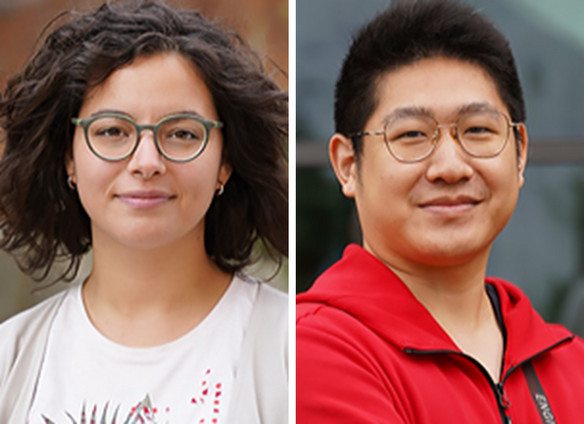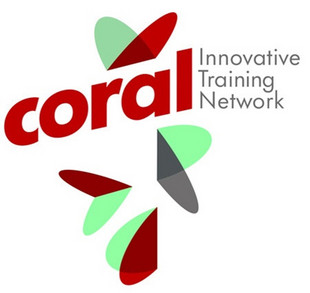Main Content
“Theory And Practice Should Walk Together”
Interview with Early Stage Researchers Federica Ammaturo and Chen Gao on the CORAL Innovative Training Network’s Introductory Event

In September 2021, the members of the EU-funded Marie Sklodowska Curie Innovative Training Network (2021-2024) “CORAL ” met online for their one-week Introductory Event. The ITN explores the contributions of collaborative workspaces (CWS), such as coworking spaces and maker spaces, to the development of rural and peripheral areas in the EU. For the first time, all 15 newly recruited Early Stage Researchers (ESRs) employed by the network’s nine partner organisations were able to meet and exchange. They presented first drafts of their PhD projects, which represent the core of the network’s research agenda. At the IRS and supervised by Suntje Schmidt, Federica Ammaturo, a planner with a degree from University of Naples Federico II and Chen Gao, an urbanist with a degree from Delft University of Technology, are currently starting their research on the roles of rural collaborative workspaces in regional development and in entrepreneurial ecosystems respectively. Here, they share their impressions of the event and their experiences of starting work in an EU-network – and in almost-rural Erkner, where the IRS is located.
Could you both say a few words about yourselves, your backgrounds, and interests?
Federica Ammaturo: My academic background is related to urban, regional, and environmental planning. I always considered my field of study a key to investigating different ecosystem’s dimensions to better understand their interrelations. My research interest for urban-rural relationships is connected to this relational and integrated planning approach as well as to my origins, as I come from a province in southern Italy that has characteristics of peripherality and rurality, with the subsequent resources and weaknesses that this implies. In the last years I studied the urban-rural linkages from different angles, touching issues of waste management, land takeover, internal migrations and citizen services in different geographical contexts.
Chen Gao: With a background in urban and rural planning from my previous studies, spatial development strategies and urbanism issues are interesting for me. And since the peri-urban topics are more and more prominent, I did quite some practical work and also focused my studies on peripheral region s. In addition, when I was in college, we students organized an open salon for both internal and external experts to share their knowledge and also did architecture and planning projects based on that organization. Therefore, I am curious about the coworking model or shared working space where ideas and professional skills meet to trigger fruitful activities and projects, which is in line with the topic of the CORAL project .
How was your start at the IRS and in Berlin and Erkner more generally?
Chen Gao: Generally, it all went great, but I still have some registration and housing issues I need to consider. Berlin is a great city and I like the quiet Erkner. The IRS feels like a tightly connected community.
Federica Ammaturo: I would say that it was a positive start, especially for the familiar and supporting atmosphere at the IRS! Erkner is a lovely place and it allows quiet pauses and walks surrounded by nature, which I really appreciate. About Berlin, I have still a lot to learn and see in this great city, and I am looking forward to discovering all its hidden beauty .
You are now not only Early Stage Researchers at the IRS but members of a very big network. Did the introductory event in September give you full orientation?
Federica Ammaturo: The kick-off meeting has been a good opportunity to meet all the other members of this wide network. Hopefully we will meet face to face soon. At the event, we got the chance to listen to tailor-made seminars that addressed many of our initial questions about the co-working related topic, as well as broader arguments such as the definition of rurality, together with practical advises and lectures supporting our PhD journey.
Chen Gao: The event gave me an initial orientation. There was a general introduction to the CORAL project, and we also shared our ideas on our individual topics. To understand the network and the participating organisations this was helpful. The research itself needs more exploration.
What was the most important lesson or maybe also the biggest surprise you take away from this week?
Federica Ammaturo: My first lesson is about shared commitment: It has been important to see how all the supervisors and ESRs are committed to delivering a meaningful work to the EU commission, putting together time, work, and experiences in a team, even though each of us has his or her own academic focus.
Chen Gao: To me it was great to see that all the ESRs in CORAL are connected well, even though we are only sharing our findings online.
Chen, you are an urbanist by your degree. What do you find interesting about collaborative workspaces in rural areas?
Chen Gao: I found that the natural characteristics of rural areas are the close social connections, and it would be a strength for rural collaborative workspaces if they could build on these ties and have a positive impact on the social perspective there, besides economic functions.
Federica, you are a planner, and you wrote in your profile that you will apply a critical perspective to CWS. What is there to be critical about with collaborative workspaces in rural areas?
Federica Ammaturo: As all the socio-economic trends, CWS in rural areas carry some positive and negative externalities that I would like to investigate from different perspectives. It is important to question if and how these spaces could really have an impact on local communities with regard to social, mobility, and housing issues, as well as their wide-ranging environmental fallout.
Could you both try to explain, in a few very simple sentences, what your PhD research will be about?
Federica Ammaturo: The definition of the research is an ongoing process: for now, as stated before, I am looking at the relevance of the surrounding community when assessing the role of a CWS. These places could provide a range of services and innovations that are able to spread and foster development in the region, but their impact depends on many factors. That is why I will look at the drivers that led to the implementation of different CWS in Italian, French and German regions, reconstructing their innovation biographies in order to provide future policy recommendation.
Chen Gao: My PhD work will, first, be about the position of collaborative working space in both local and trans-local entrepreneurial ecosystems in peripheral areas. And second, it will seek to answer the question, how a spatial intervention or strategy could foster the function of collaborative working space from both social and economic perspectives.
What do you hope for in those coming years and what are you (if anything) afraid of?
Chen Gao: I hope that I will continue to find meaningful and relevant insights in this work. Personally, I also hope to meet new friends here, that life goes smoothly, and that, finally, the COVID19 pandemic will end.
Federica Ammaturo: My hopes and worries both concern the same issue: building a meaningful and beneficial work not only to the academic world but also to the institutional realm. I think theory and practice should walk together in order to create a real change, and this project allows us young researchers to do so. I hope I will measure up with it and enjoy this international experience!
Thank you!


